-
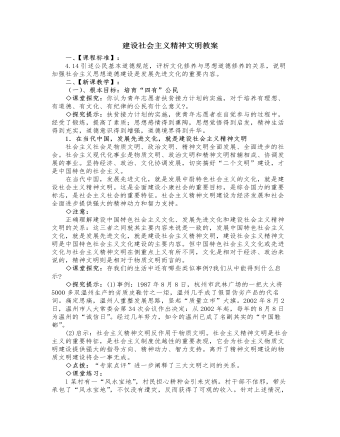
人教版高中政治必修3建设社会主义精神文明教案
(2)伟大的意义:这些精神文明创建活动,是人民群众“移风易俗”、改造社会的伟大创造,也是人民群众自我教育、自我提高的有效途径。各具特色的精神文明创建活动,使人们在自觉参与的过程中思想感情得到熏陶,思想觉悟得到启发,精神生活得到充实,道德意识得到增强,道德境界得到升华。这对整个中华民族的精神面貌,正在产生不可估量的积极影响。◇点拨:“相关链接”描述了青年志愿者活动,引导学生感悟其精神,升华道德境界,增强参与意识。(3)必然的选择:投身于社会主义精神文明建设的伟大实践,做新时期中国先进文化的传播者和建设者,是当代中国青年成长、成才的必然选择。◇拓展延伸:在群众性精神文明创建活动中涌现出的先进人物和英雄模范,像孔繁森、张海迪、徐洪刚、韩素云、李国安、徐虎、李素丽等,在全社会起到了良好的示范作用;提出的一些响亮口号,如“从我做起,从现在做起”“岗位学雷锋,行业树新风”“单位做个好职工,社会做个好公民,家庭做个好成员”等,不断激励着人们。
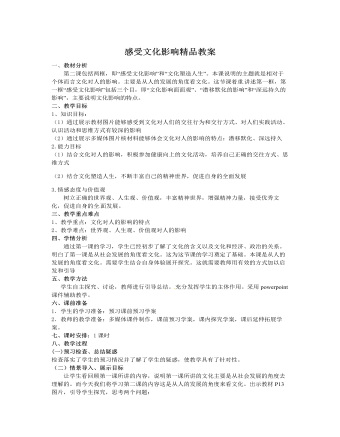
人教版高中政治必修3感受文化影响精品教案
(三)合作探究、精讲点拨 【情景导入,感受文化的影响】用多媒体展示教材“活动探究”P13的内容(图文并茂)情景问题:① 从这两幅画面中发现了哪些文化上的区别?你还能举出更多的事例吗?② 面对我们祖先创造的精美文化产品,人们的感慨,既有差异,又有共同之处。你能否解释这是为什么?(学生讨论、回答)情景问题:让学生阅读“活动探究”情景,带着这些问题去思考、合作、探究,在学生交流、探究的基础上,分组派代表完成这些问题,突出了学生的主体地位。设计意图:1、开门见山的方式引导学生进行新的学习探究活动,创设问题情景,引起悬念,吸引学生的注意力,激发学生的学习兴趣和探究欲望。2、通过自主探究,让学生感悟到道理越辩越明,促使学生存疑、质疑,从而产生强烈的探究欲望。
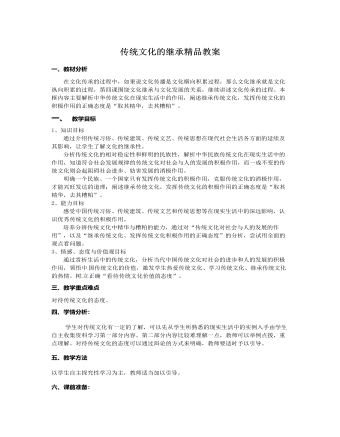
人教版高中政治必修3传统文化的继承精品教案
一、教材分析在文化传承的过程中,如果说文化传播是文化横向积累过程,那么文化继承就是文化纵向积累的过程,第四课围绕文化继承与文化发展的关系,继续讲述文化传承的过程。本框内容主要解析中华传统文化在现实生活中的作用,阐述继承传统文化,发挥传统文化的积极作用的正确态度是“取其精华,去其糟粕”。一、 教学目标1、知识目标通过介绍传统习俗、传统建筑、传统文艺、传统思想在现代社会生活各方面的延续及其影响,让学生了解文化的继承性。分析传统文化的相对稳定性和鲜明的民族性,解析中华民族传统文化在现实生活中的作用,知道符合社会发展规律的传统文化对社会与人的发展的积极作用,而一成不变的传统文化则会起阻碍社会进步、妨害发展的消极作用。明确一个民族、一个国家只有发挥传统文化的积极作用,克服传统文化的消极作用,才能兴旺发达的道理;阐述继承传统文化,发挥传统文化的积极作用的正确态度是“取其精华,去其糟粕”。
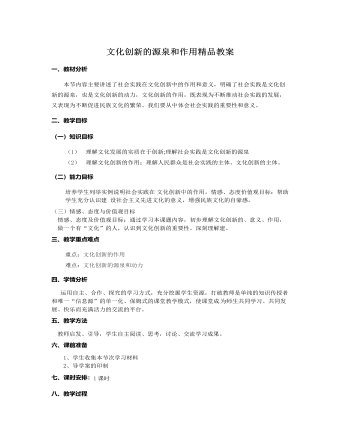
人教版高中政治必修3文化创新的源泉和作用精品教案
一、教材分析本节内容主要讲述了社会实践在文化创新中的作用和意义,明确了社会实践是文化创新的源泉,也是文化创新的动力,文化创新的作用,既表现为不断推动社会实践的发展,又表现为不断促进民族文化的繁荣。我们要从中体会社会实践的重要性和意义。二、教学目标(一)知识目标(1) 理解文化发展的实质在于创新;理解社会实践是文化创新的源泉(2) 理解文化创新的作用;理解人民群众是社会实践的主体、文化创新的主体。(二)能力目标培养学生列举实例说明社会实践在 文化创新中的作用。情感、态度价值观目标:帮助学生充分认识建 设社会主义先进文化的意义,增强民族文化的自豪感。 (三)情感、态度与价值观目标情感、态度及价值观目标:通过学习本课题内容,初步理解文化创新的、意义、作用,做一个有“文化”的人,认识到文化创新的重要性。深刻理解建。
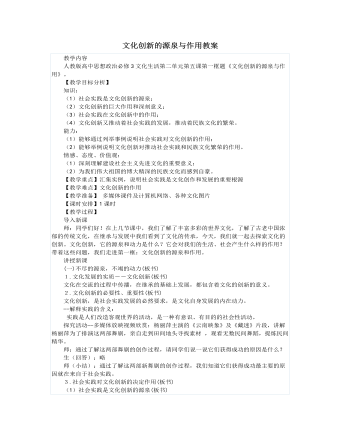
人教版高中政治必修3文化创新的源泉与作用教案
(三)呼唤文化创新的时代(板书)1.人民群众是文化创造的主体--(板书)师:【图片文字展示】--《离骚》、《九歌》、《水浒传》、《三国演义》均取材自民间,在民间口述文字的基础上加工形成,所以,我们可以看到,文化创新的主体是谁?生:人民群众是文化创造的主体师:在新的历史时期,我们的青少年应该怎么做?生:虚心向人民群众学习,从人民群众的伟大实践和丰富多彩的生活中汲取营养,这是当代中国文化工作者的使命和职责。2.文化工作者必须坚定地走与人民群众的实践相结合的道路--(板书)3.当代中国文化创作者的使命和职责。(板书)【课堂小结】通过本节课的探究学习,我们认识到文化创新的源泉和作用,要求我们虚心向人民群众学习,从人民群众的伟大实践和丰富多彩的生活中汲取营养,刻苦钻研,锐意创新,为全面建设小康社会而奋斗。
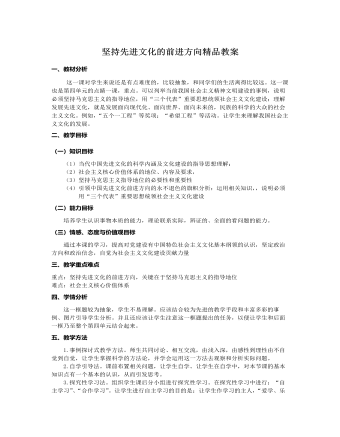
人教版高中政治必修3坚持先进文化的前进方向精品教案
一、教材分析这一课对学生来说还是有点难度的,比较抽象,和同学们的生活离得比较远。这一课也是第四单元的点睛一课,重点。可以列举当前我国社会主义精神文明建设的事例,说明必须坚持马克思主义的指导地位,用“三个代表”重要思想统领社会主义文化建设;理解发展先进文化,就是发展面向现代化、面向世界、面向未来的,民族的科学的大众的社会主义文化。例如,“五个一工程”等奖项;“希望工程”等活动。让学生来理解我国社会主义文化的发展。二、教学目标(一)知识目标(1)当代中国先进文化的科学内涵及文化建设的指导思想理解:(2)社会主义核心价值体系的地位、内容及要求,(3)坚持马克思主义指导地位的必要性和重要性(4)引领中国先进文化前进方向的永不退色的旗帜分析:运用相关知识,,说明必须用“三个代表”重要思想统领社会主义文化建设
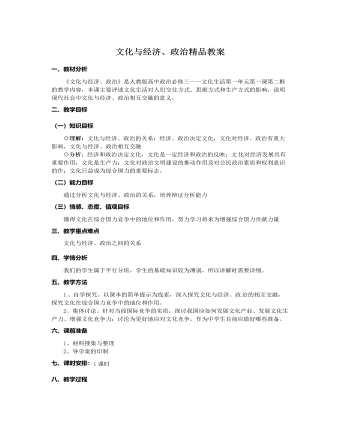
人教版高中政治必修3文化与经济、政治精品教案
一、教材分析《文化与经济、政治》是人教版高中政治必修三——文化生活第一单元第一课第二框的教学内容,本课主要评述文化生活对人们交往方式、思维方式和生产方式的影响,说明现代社会中文化与经济、政治相互交融的意义。二、教学目标(一)知识目标◇理解:文化与经济、政治的关系:经济、政治决定文化,文化对经济、政治有重大影响,文化与经济、政治相互交融 ◇分析:经济和政治决定文化,文化是一定经济和政治的反映;文 化对经济发展具有重要作用,文化是生产力;文化对政治文明建设的推动作用及对公民政治素质和权利意识的作;文化日益成为综合国力的重要标志。(二)能力目标通过分析文化与经济、政治的关系,培养辩证分析能力(三)情感、态度、值观目标懂得文化在综合国力竞争中的地位和作用,努力学习将来为增强综合国力贡献力量
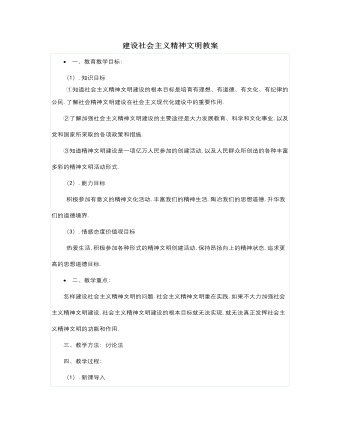
人教版高中政治必修3建设社会主义精神文明教案
师:三亚目前正在强调打造文化产业,如举办文体大赛,提升三亚知名度.如今"美丽三亚,浪漫天涯"已成为三亚一张旅游名片,以文化产业的发展带动经济旅游的发展,大家结合今天的三亚文化产业发展谈谈发展文化事业和文化产业的作用.学生:回答(略)。师:要支持文化产业发展,增强我国文化产业的整体实力和竞争力.? 3. 亿万人民的创建活动(板书) (1).人民群众是精神文明创建活动的主体。学生朗读课文P103页,理解亿万人民是精神文明创建活动的主体.师:发展先进文化,本质上是一个立足于建设中国特设社会主义伟大实践而不断进行文化创造的过程,也就是社会主义精神文明的创建过程.(2).人民群众参与精神文明创建活动的意义.师:人民群众在社会主义精神文明建设活动中,创造了丰富多彩的形式,在参与的过程中思想感情得到熏陶,思想觉悟得到启发,精神生活得到充实,道德意识得到增强,道德境界得到升华.这对整个中华民族的精神面貌,正在产生不可估量的积极影响.
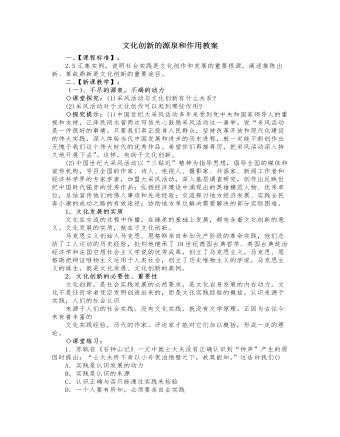
人教版高中政治必修3文化创新的源泉和作用教案
(1)社会实践是文化创新的源泉实践,作为人们改造客观世界的活动,是一种有目的、有意识的社会性活动。人类在改造自然和社会的实践中,创造出自己特有的文化。离开了社会实践;文化就会成为无源之水、无本之木,人们不可能从事任何有价值的文化创造。◇本课小结:1.关于本课逻辑结构的宏观把握:文化创新的源泉和作用这一问题,教材分三个层次展开论证:一是不尽的源泉,不竭的动力;二是巨大的作用,深刻的意义;三是呼唤文化创新的时代。教材运用辩证方法从文化创新的源泉和作用展开论述。即社会实践是文化创新的源泉,文化创新又推动社会实践的发展和促进民族文化的繁荣。教材关于文化创新的途径问题,从三个层次展开讲述:第一个层次是“继承传统,推陈出新”;第二个层次是“面向世界,博采众长”;第三个层次是“坚持正确方向,克服错误倾向”。三个层次三个角度,着重于分析每一个层次,然后予以归纳总结,即采用了分析归纳法,层次清晰,教学目标明确,既便于传授知识,又便于学生学习时识记、理解和把握。
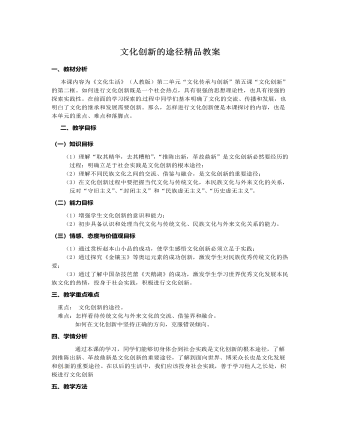
人教版高中政治必修3文化创新的途径精品教案
一、教材分析本课内容为《文化生活》(人教版)第二单元“文化传承与创新”第五课“文化创新”的第二框。如何进行文化创新既是一个社会热点,具有很强的思想理论性,也具有很强的探索实践性。在前面的学习探索的 过程中同学们基本明确了文化的交流、传播和发展,也明白了文化的继承和发展需要创新。那么,怎样进行文化创新便是本课探讨的内容,也是本单元的重点、难点和落脚点。二、教学目标(一)知识目标 (1)理解“取其精华,去其糟粕”,“推陈出新,革故鼎新”是文化创新必然要经历的过程;明确立足于社会实践是文化创新的根本途径;(2)理解不同民族文化之间的交流、借鉴与融合,是文化创新的重要途径;(3)在文化创新过程中要把握当代文化与传统文化,本民族文化与外来文化的关系,反对“守旧主义”、“封闭主义”和“民族虚无主义”、“历史虚无主义”。

新人教版高中英语必修3Unit 1 Festivals and Celebrations-Reading and Thinking教学设计
The topic of this part is “Discover the reasons for festivals and celebrations.The Listening & Speaking & Talking part aims at talking about the experiences and feelings or emotions about the festivals and celebrations. This section aims at detecting the reason why the people celebrate the festivals, the time, the places, the types and the way of celebrations. It also explains why some traditions in the old celebrations are disappearing, like the firecrackers in the big cities and some new things are appearing like the prosperity of business or commerce. 1. Students can talk about what festivals they know and the reasons and the way of celebrating them.2. Students should learn the reading skills such as the headline and get the topic sentences, the structures of articles.3. Students can understand the past, the present situation of some festival around the world and why there are some changes about them. 4. Students can have the international awareness about the festivals.1. Students should learn the reading skills such as the headline and get the topic sentences, the structures of articles.2. Students can understand the past, the present situation of some festival around the world and why there are some changes about them.Step 1 Lead in---Small talkWhat festival do you like best ? Why ?I like the Spring Festivals because I can set off the fireworks, receive the lucky money and enjoy the Gala with my families.Step 2 Before reading---Pair workWhy do people celebrate different festivals ?The Spring Festivals is to celebrate the end of winter and the coming of spring and new life.The Mid-autumn Day is to celebrate the harvest and admire the moon.

新人教版高中英语必修3Unit 1 Festivals and Celebrations-Reading for writing教学设计二
Step 3 Analyzing article structureActivity 31. Teachers raise questions to guide students to analyze the chapter structure of this diary and think about how to describe the festival experience. (1)What should be included in the opening/body/closing paragraph(s)?(2)How did the writer arrange his/her ideas?(3)What kind of interesting details did the writer describe?(4)How did the writer describe his/her feelings/emotions during the event?2. Students read and compare the three sentence patterns in activity 2. Try to rewrite the first paragraph of the diary with these three sentence patterns. After that, students exchange corrections with their partners. Such as:●This was my first time spending three days experiencing the Naadam Festival in China’s Inner Mongolia Autonomous Region and it was an enjoyable and exciting experience. ●I'll never forget my experience at the Naadam Festival because it was my first time to watch the exciting Mongolian games of horse racing, wrestling, and archery so closely. ●I'll always remember my first experience at the Naadam Festival in China’s Inner Mongolia Autonomous Region because it was so amazing to spend three days witnessing a grand Mongolian ceremony. Step 4 Accumulation of statementsActivity 41. Ask the students to read the diary again. Look for sentences that express feelings and emotions, especially those with the -ing form and the past participle. Such as:● …horse racing, wrestling, and archery, which are all so exciting to watch. ● some amazing performances● I was surprised to see…● I was a little worried about. . . ● feeling really tiredOther emotional statements:●I absolutely enjoyed the archery, too, but the horse races were my favourite part. ●I'm finally back home now, feeling really tired, but celebrating Naadam with my friend was totally worth it. ●He invited me back for the winter to stay in a traditional Mongolian tent and cat hot pot. I can’t wait!2. In addition to the use of the -ing form and the past participle, the teacher should guide the students in the appreciation of these statements, ask them to memorize them, and encourage them to use them reasonably in writing practice.

新人教版高中英语必修3Unit 2 Morals and Virtues-Listening &Speaking&Talking教学设计
Example:One day, a poor boy who was trying to pay his way through school by sending newspapers door to door found that he only had one dime(一角)left. He was so hungry that he decided to beg for a meal at the next house.However, he lost his nerve when a lovely young woman opened the door. Instead of a meal he asked for a drink of water. She thought he looked hungry so she brought him a large glass of milk. He drank it slowly, and then asked, “How much do I owe you?” “You don’t owe me anything,” she replied, “Mother has taught me never to accept pay for a kindness.” “Then I thank you from the bottom of my heart.” With these words, Howard Kelly left that house.Years later the woman became badly ill and was finally sent to the hospital in a big city. Dr. Howard Kelly, now famous, was called in. When he heard the name of the town she came from, a strange light filled his eyes. Dressed in his doctor’s clothes, Dr. Kelly went into her room and recognized her at once. From that day on, he gave special attention to her, and decided to do his best to save her life.At last the woman was saved. Dr. Kelly asked the business office to pass the final bill to him. He looked at it and then wrote something on the side. The bill was sent to the woman’s room. She was afraid to open it because she was sure that it would take the rest of her life to pay for it off. Finally she looked, and the note on the side of the bill caught her attention. She read these words: “Paid in full with a glass of milk, Dr. Howard Kelly.” Tear of joy flooded her eyes.

新人教版高中英语必修3Unit 4 Space Exploration-Listening&Speaking&Talking教学设计一
Listening and Speaking introduces the topic of “talking about how to become an astronaut”. This period is aimed to inform students some details about the requirements of being an astronaut. Students can be motivated and inspired by the astronauts. Teachers ought to encourage students to learn from them and let them aim high and dream big.Listening and Talking introduces the theme of "talk about life in space". This part also informs students more details about life in space and can inspire students to be curious about this job. 1. Guide students to listen for numbers concerning dates, years and ages etc2. Cultivate students' ability to talk about how to become an astronaut and life in space ; 3. Instruct students to use functional sentences of the dialogue such as “ first of all, I am not sure, so what might be .. I guess.. I wonder…I am curious…)appropriately.1. Guide students to understand the content of listening texts in terms of the whole and key details; 2. Cultivate students' ability to guess the meaning of words in listening; discuss with their peers how to become a qualified astronaut and describe the life in space.Part 1: Listening and SpeakingStep 1: Lead inPredictionThe teacher can ask students to predict what the listening text is about by looking at the pictures.About how to become an astronaut./the requirements of an astronautStep 2: Then, play the radio which is about an interview a. And after finishing listening for the first time, the students need to solve the following tasks.

新人教版高中英语必修3Unit 4 Space Exploration-Reading for Writing教学设计二
⑦在我看来, 探索太空是值得的。As far as I am concerned, it is worthwhile to explore the space.Step 10 Writing---draftRecently, students in our class have had heated a discussion on whether space is worth exploring. Students hold different ideas about it.30% of us think space exploration is not worthwhile. They think space is too far away from us and our daily life and is a waste of money. And the money spent on space exploration can be used to solve the earth’s problems such as starvation and pollution.On the other hand,70% think space is worth exploring because we have benefited a lot from it,such as using satellites for communication and weather forecast. What’s more,with further space research,we may solve the population problem by moving to other planets one day. Also,space research will enable us to find new sources to solve the problem of energy shortages on the earth.As far as I am concerned, it is worthwhile to explore the space. Not only can it promote the development of society but also enrich our life. Step 11 Pair workExchange drafts with a partner. Use this checklist to help your partner revise his/her draft.1.Does the writer explain why he/she changed/wanted to change?2.Does the writer tell how the changes have improved or will improve his/her life?3.Is the text well-organised?4.Does the writer use words and expressions to show similarities and differences?5.Are there any grammar or spelling errors?6.Does the writer use correct punctuation?

新人教版高中英语必修3Unit 5 The Value of Money-Listening &Speaking&Talking教学设计
4. A:We’d like to have someone to say a word at the beginning to welcome the group.B:↙Who?A:We thought that you or Dr.Johnson might do it.B用降调说Who,其意思是问,对方想让谁在开场时致欢迎词。Step 6 Pronunciation---Practice1. Listen to the short conversation and mark the intonation with ↗, ↙ or ↙, ↗. Then discuss with a partner what they intend to convey by using different intonation.Owner: You know what ?↗ It’s a million-pound bank note↙.Waiter 1: Really ?↗(question)Waiter 2: Really !↙(unbelievable and surprised)Waiter 3: Really ?!↙↗(first question then surprised)2. Listen to the conversations. Underline the parts that are stressed and mark the intonation. Then talk about the implied meanings of the responses with different intonations. Listen again and repeat.1) Henry: It’s a nice suit.Owner: Oh, it’s perfect!↙(The intonation means it is very suitable for Henry.)2) Henry: Well, that’s very kind of you.Owner: Kind, sir ?↗(what you said is not right) No, it’s kind of you. You must come whenever you want and have whatever you like. Just having you sit here is a great honour !!↙(welcome you to come again)3)Henry:Well, to be honest, I have none. Oliver:(happily) What luck!(excited) Brother↗, what luck!↙(It means “Didn’t you hear it?”)Henry: Well, it may seem lucky to you but not to me!↗(angry) If this is your idea of some kind of joke, I don’t think it’s very funny. Now if you’ll excuse me, I ought to be on my way.↙(If so, I would leave.)Roderick: Please don’t go↙...(hope Henry can wait for a moment)Part B Viewing and Talking---Describe people’s changing attitudes in a film clipStep 1 Before-listening---Tell the filmYou are going to watch part of the film The Million Pound Bank Note. Look at these photos and guess what happens in the film.

新人教版高中英语必修3Unit 5 The Value of Money-Listening &Speaking教学设计
Step 4: Listen again and decide if the following statements are true (T) or false (F).1 It was the first time Chen Liyan's story was reported. T口 F口2 Chen found 10,000 yuan in a small plastic bag in Taiyuan railway station口 F口3 Wang Zheng apologized to Chen because he couldn't offer her more money. T口 F口4 Chen took out a large loan to cure her daughter, T口 F口5 Wang set up a fundraising website for Chen's daughter after Chen told him about her situation. T口 F口Step 5:After listening, discuss the questions.1 What kind of person do you think Chen Liyan is?Chen Liyan is generous and honest because she returned a large sum of money to the owner.2 Did Chen return the money because she didn't need it?No. She returned the money because it was the right thing to do. Evidence for this is that she refused to accept the reward money because she felt that it had not been earned. 3 Is it common for people to do what Chen did?It depends on the culture. In some countries it is quite common to return money that has been found. In other countries, people believe "Finders are keepers!" 4 How did Wang Zheng feel about the return of his money?He must have been very happy and relieved to have gotten his money back. We know this because he thanked Chen repeatedly and even offered her a reward.5 Why did Ma Dongbao tell Wang about Chen's family?He must have had great sympathy for Chen and her daughter and wanted to help them.'We know this because he arranged help for them. 6 How did the news reporter feel about Chen's actions?The news reporter felt that it showed that money wasn't the most important thing in life. We know this because the reporter told us that this is what Chen believes. and then said, “that's a great attitude to take."

新人教版高中英语必修1Unit 3 Sports and Fitness-Listening and Speaking & Listening and Talking教案
Finally, after finishing the task above, the teacher is expected to instruct students to work in groups to finish the following project:Speaking ProjectWhat event or activity would you like to invite your friend to? Make a conversation with a partner.Ski Race: Zhangjiakou, a beautiful city in northern China, will host the Youth Ski Race in December.Track Meet: a great event for track –and –field lovers on 26 October.Gym Class: come and work out at a gym! You can make it.Part 2: Listening and Talking:The teacher is advised to talk with their new students about the related topic: Boys and girls , what do you think of sportsmanship? Let’s listen and find out:Play the listening and match each opinion with the right speaker. Who do you agree with? Why?Cao Jing _____________ Lily _____________ Max _____________A. An athlete should do his/her best to win.B. The girl should stop and help the other girl. Good sportsmanship is more important than wining!C. An athlete should think about honor and his/her fans if he/she is competing for his/her country.Listen again and circle the expressions that you hear in the conversation.

新人教版高中英语必修1Unit 3 Sports and Fitness- Discovering Useful Structures—tag questions教案
【教材分析】This teaching period mainly deals with the grammar: tag questions.This period carries a considerable significance to the cultivation of students’ spoken English. The teacher is expected to enable students to master this period thoroughly and consolidate the knowledge by doing some exercise of good quality.【教学目标与核心素养】1. Get students to have a good understanding of the basic usages of tag questions.2. Enable students to use the basic phrases structures flexibly.3. Develop students’ speaking and cooperating abilities.4. Strengthen students’ great interest in grammar learning.【教学重难点】1. How to enable students to have a good understanding of the basic usages of tag questions.2. How to enable students to use the basic usages of tag questions flexibly.【教学过程】Step1: 语法自主探究一、基本组成方法1.肯定式陈述部分+否定附加疑问部分(前肯后否) You often play badminton, don’t you? 你经常打羽毛球,是吗?You are going to the gym with me, aren’t you?你要和我一起去健身房,是吗?She’s been to shanghai before, hasn’t she? 她以前去过上海,是吗?2.否定式陈述部分+肯定附加疑问部分(前否后肯) It isn't a beautiful flower, is it? 那不是美丽的花,是吗?You didn't go skating yesterday, did you? 你昨天没去滑冰,是吗?They can’t finish it by Friday, can they?他们不能在星期五之前完成,是吗?

新人教版高中英语必修3Unit 1 Festivals and Celebrations-Listening &Speaking&Talking教学设计
The theme of this section is “Talk about festival activities and festival experiences”.Festival and holiday is a relaxing and interesting topic for students. This part talks about the topic from the daily life of students’. In the part A ---Listening and Speaking, there are three conversations among different speakers from three countries(Japan, Rio and China), where the speakers are participating in or going to participate in the festivals and celebrations. So listening for the relationship among them is a fundamental task. Actually, with the globalization and more international communication, it is normal for Chinese or foreigners to witness different festivals and celebrations in or out of China. In the Conversation 1, a foreign reporter is interviewing a Japanese young girl who just had participated in the ceremony of the Coming-of-Age Day on the street and asking her feeling about the ceremony and the afterwards activities. Conversation 2, Chinese girl Li Mei is witnessing the Rio Carnival for the first time, and her friend Carla gives her some advice on the costumes which enables her to match with the carnival to have a good time. Conversation 3, a Chinese guide is showing a group of foreign visitors around the Lantern Festival and introducing the customs of the festival to them. The three conversations have a strong vitality and insert the festival and cultural elements from different countries. So perceiving the festivals and cultures from different countries is the second task. At the same time, the scripts also insert the targeted grammar --- v-ing as attributive and predicative, which students can perceive and experience in a real context and make a road for the further study. That is the third task. In the Part B--- Listening and Talking, the theme is “Talk about festival experience”, which is the common topic in our daily conversations. During the conversation, Song Lin, a Chinese student, asked Canadian friend Max about how to spend Christmas. In the conversation, Song Lin talked about experience and the feelings during the Chinese Spring Festival, during which there are not only some enjoyable things but some unpleasant things. After the listening, perhaps students find there are some similarities between Christmas and the Chinese Spring Festival as there are some differences in the origins and celebrations. For example, people always visit friends and relatives, decorate their houses, have a big dinner together, chat and give presents to each other.